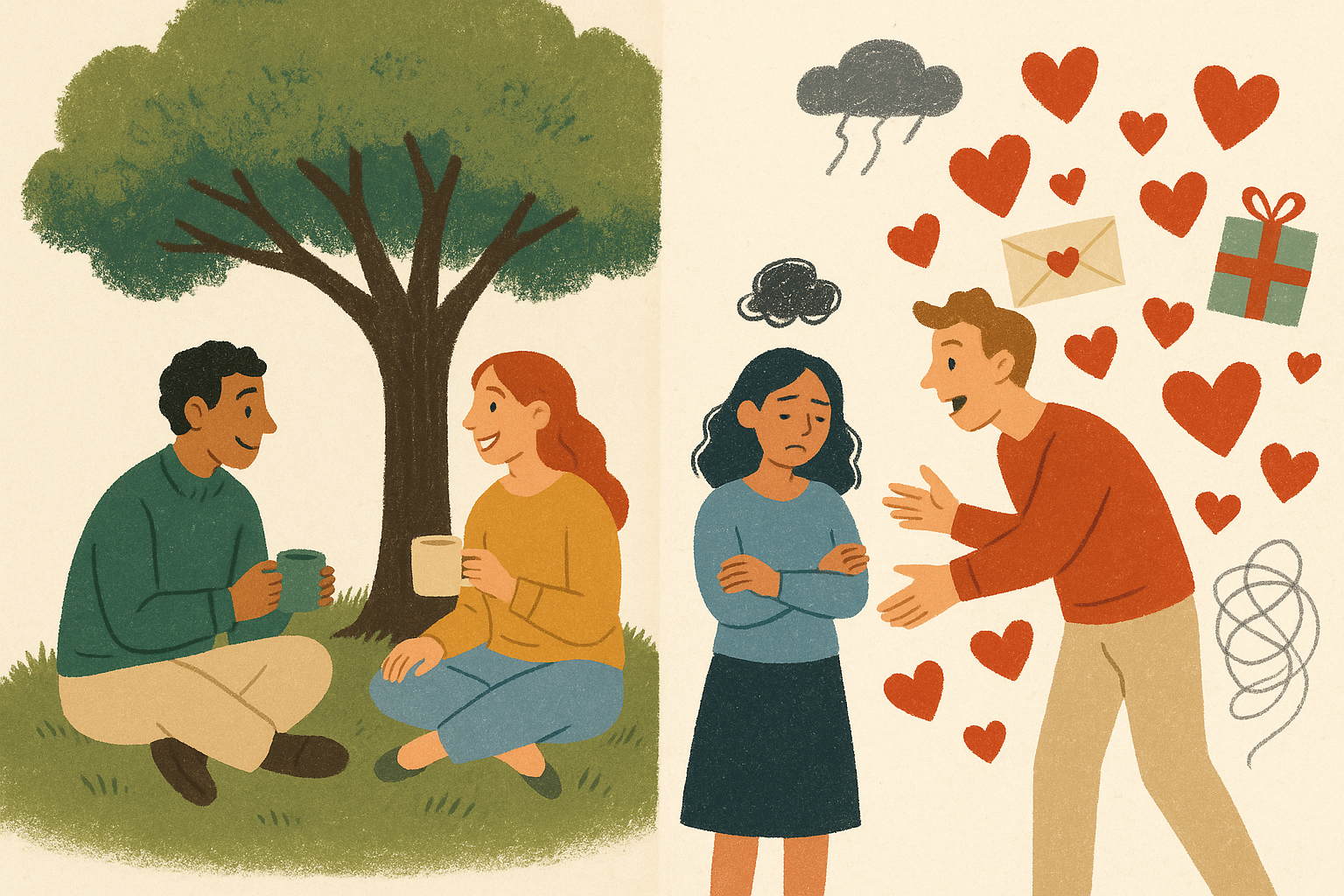A Neurodivergent Guide to Emotional Signals
Some people send flowers. Some people send walls of text. Some people send memes at 1am.
All of it can look like affection.
All of it can feel like connection.
But how do you tell when something good becomes… too much?
Especially if you’re neurodivergent, the line between genuine kindness and love bombing can feel confusing. And honestly? That confusion makes sense. A lot of us experience the world more intensely—emotionally, socially, or sensorily. We notice patterns others miss. And sometimes we miss signals everyone else seems to understand.
So this is a post for the overthinkers, the deep-feelers, the folks who’ve been told they’re “too much” or “too cold,” and anyone who’s ever asked:
Is this real, or is this love bombing?
Let’s Break It Down: Kindness vs. Love Bombing
On the surface, love bombing can look a lot like kindness. But the difference is in intent, timing, and boundaries.
| Kindness | Love Bombing | |
|---|---|---|
| Pace | Steady, natural | Fast, intense, overwhelming |
| Intent | Care without strings | Gain closeness or control fast |
| Boundaries | Respects yours, checks in | Pushes, ignores, or manipulates your limits |
| Consistency | Reliable, grounded over time | Hot-and-cold; may disappear or pull back harshly |
| Response to “No” | Accepting, even grateful | Guilt, withdrawal, or emotional punishment |
Love bombing isn’t always malicious, but it is always about control disguised as affection.
Now Add Neurodivergence to the Mix
Things get complicated when you layer in ADHD, autism, PDA, CPTSD, sensory processing differences, or any other neurotype that plays with time, trust, or emotional regulation.
Here’s why:
1. We Might Express Big
Some of us communicate love or interest with intensity. We might text a lot, get hyperfocused on a new connection, or want to share everything. Not to manipulate. Just to connect. It can accidentally look like love bombing—but it’s not.
2. We Might Miss Signals
Subtle cues don’t always register. A pause in a conversation, a short reply, a shift in tone—those might go unnoticed. Not because we don’t care, but because we process communication differently.
3. Boundaries Are a Skillset
If you’ve been masking, fawning, or surviving in systems that didn’t fit, you may struggle to say “no” or to hear it without spiraling. Boundaries aren’t intuitive for everyone—they’re learned. That’s okay. But they’re essential in distinguishing safe care from controlling behavior.
4. We Might Flood and Freeze
Overstimulation or emotional overwhelm can cause us to retreat suddenly or shut down. To others, this can feel like ghosting—or like we are the love bomber. But often, it’s not intentional. It’s regulation.
How to Tell What’s Going On
If you’re wondering whether someone is being kind or love bombing you—or if you’re worried you’re love bombing someone unintentionally—try asking yourself:
- Is there space to say no or ask for a slower pace?
- Does this relationship have breathing room, or does it feel like a sprint?
- Am I making choices based on excitement… or fear?
- Is this connection mutual—or am I performing closeness to stay safe or be liked?
And most importantly:
Do I feel like myself in this relationship? Or do I feel like I’m being shaped into something else?
What Helps
Here’s what’s helped me, and what I offer others:
- Check in, not just check on. Ask: “How is this pace feeling for you?” and actually mean it.
- Set your own baseline. What does healthy connection feel like when you’re calm, clear-headed, and not in a trauma response?
- Talk about communication styles early. “I tend to message a lot when I’m excited—let me know if that feels like too much.”
- Recognize your attachment patterns. If you’re used to being dismissed, love bombing might feel safe. But safety isn’t the same as sustainability.
The Point Isn’t to Be Less Intense
If you’re neurodivergent, you don’t need to tone yourself down to be lovable.
And if someone’s being kind to you, your job isn’t to push them away just in case they’re dangerous.
The point is to stay awake to what’s happening—emotionally, socially, and relationally—so you can respond instead of react.
Kindness feels grounding.
Love bombing feels like a rush… followed by a crash.
The more you notice the difference, the more space you have to build something real.





